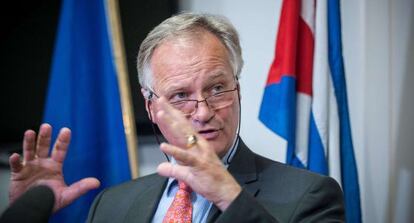Cuba and EU leaders agree to restart economic and political relations
EU members and Havana decide to push back debate on human rights

Politics and economics will be the main topics of conversation at the relaunch of the new Political Dialogue and Cooperation Agreement between Cuba and the European Union. According to remarks by European External Action Service (EEAS) Director General for the Americas Christian Leffler, the debate on securing human rights on the island will come later. The objective of the first round of talks was establishing the foundation and framework for future negotiations on normalizing bilateral relations and lifting the Common Position in the future. The Union’s Common Position is a veto that frames any discussion regarding democracy and basic human rights within Cuba.
After private meetings in Havana on Tuesday, the parties agreed to build the new agreement on three pillars: political dialogue and governance, cooperation and regional politics, and economy and commerce. The accord will also contain a section on management of the bilateral relationship.
The interpretation of human rights is still a point of disagreement for Cuba and the EU but it will be continue to be “an important theme in the development of the agreement,” Leffler said. The parties’ conclusion will be incorporated “in the appropriate manner” in the section on politics and governance, he added.
Havana and Brussels avoided debate on the current Common Position during this first meeting. EU members approved that diplomatic framework on December 2, 1996 at the urging of then Spanish President José María Aznar. “The Common Position is still in force in the European Union,” Leffler began. “And we all know that. It is not going to change at the beginning of these negotiations. We haven’t talked about it. The negotiations are taking their logical course. They have their own dynamic.” For the government of the Castro brothers, EU sanctions are nothing more than an extension of the commercial and financial embargo the United States has imposed on Havana since the 1960s.
The Common Position is still in force in the European Union. The negotiations are taking their logical course. They have their own dynamic.”
Cuba is the only country in the region with which the European Union has not signed a Political Dialogue and Cooperation Agreement. Still, this fact has not kept half of EU members from maintaining relations with the island. Fourteen countries currently hold cooperation agreements and memoranda of understanding with Havana and about 50 percent of direct foreign investment on the island comes from Europe.
The restart of bilateral relations coincides with the passage of a new law to attract foreign investment to Cuba. This measure, approved in late March, is one step in the slow process to liberalize the economy and modernize the Socialist model that Raúl Castro implemented in an attempt to salvage the depleted coffers of the regime.
The European Union took the first step on January 29 of this year. The Foreign Affairs Council decided, by unanimous vote, to discuss a new framework for political dialogue with Cuba after a lengthy period of debates and consultations. At that point, countries like Germany, Poland and the Czech Republic that held reservations had the opportunity to press for supervision of human rights on the island. A month later, on March 6, the Cuban government accepted the EU invitation to begin a dialogue.
No date has been set for the second round of talks but meetings are expected to take place every two months in Havana or in Brussels. In the interim, the parties will keep in touch through phone conversations, e-mails and video conferences.
Translation: Dyane Jean François
Tu suscripción se está usando en otro dispositivo
¿Quieres añadir otro usuario a tu suscripción?
Si continúas leyendo en este dispositivo, no se podrá leer en el otro.
FlechaTu suscripción se está usando en otro dispositivo y solo puedes acceder a EL PAÍS desde un dispositivo a la vez.
Si quieres compartir tu cuenta, cambia tu suscripción a la modalidad Premium, así podrás añadir otro usuario. Cada uno accederá con su propia cuenta de email, lo que os permitirá personalizar vuestra experiencia en EL PAÍS.
¿Tienes una suscripción de empresa? Accede aquí para contratar más cuentas.
En el caso de no saber quién está usando tu cuenta, te recomendamos cambiar tu contraseña aquí.
Si decides continuar compartiendo tu cuenta, este mensaje se mostrará en tu dispositivo y en el de la otra persona que está usando tu cuenta de forma indefinida, afectando a tu experiencia de lectura. Puedes consultar aquí los términos y condiciones de la suscripción digital.









































